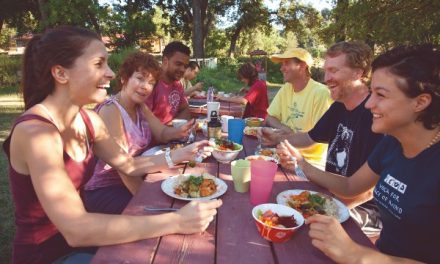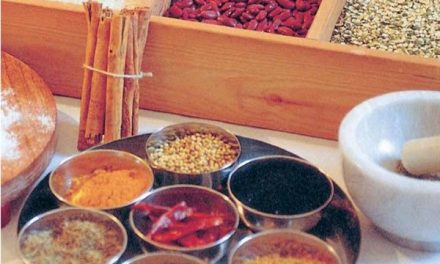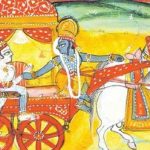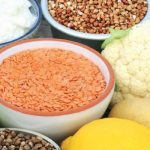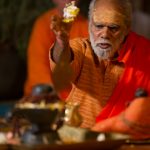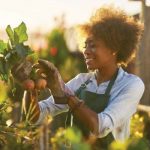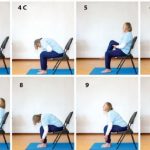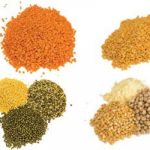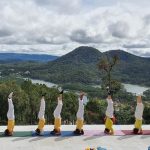 WHY SHOULD WE BE VEGETARIAN
WHY SHOULD WE BE VEGETARIAN
BY JEAN JAMES GARREAU
Today this question is at the heart of many institutions in our public life and regularly makes the front page of magazines, because we are at a time when we are living a true ‘food transition’.
We need a better way to feed an increasingly populated planet and try to stop, on a worldwide scale, malnutrition by excess (obesity) or by default (famine)..
Nevertheless, I imagine that you, reader of this magazine, because of your approach and your interest in yoga, already follow this vegetarian diet. And to tell the truth, I do not know any vegetarians well-established in this diet, who are not familiar with dietary, culinary and other issues concerning it.
The reflection I would like to share with you revolves more around a summarised approach made up of many good reasons and motivations that inspire us to become vegetarian and maintain us sustainably on this diet.
In Western culture, you do not become vegetarian just like that, either by tradition or impulse … it is more of an individual approach, like learning to walk – you get up, you try, you fall, you start again … and then you get there.
The reasons that govern this change are often very diverse and to complicate matters, sometimes very personal. I would therefore articulate them around three main lines of thought: health, fullness, and joy.
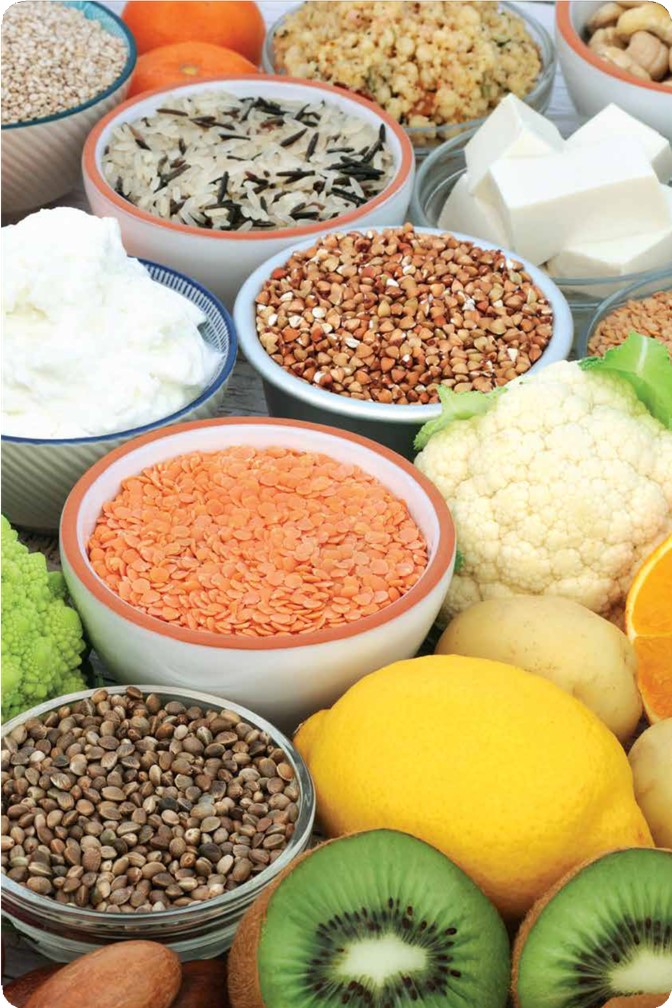 Health and vegetarianism
Health and vegetarianism
It is a field with many studies that are accessible to each and every one of us.
In the preamble, let us briefly recall what is generally meant by a person following a vegetarian diet: a person who does not eat meat or fish, but who consumes eggs and dairy pro- ducts. We also speak of an ovo- lacto-vegetarian diet. The yogic diet is lacto- vegetarian: a diet that also excludes eggs.
It is distinguished from vegan diets that do not include any animal products.
And then there has been another fashionable term in recent years, “flexitarian”, which refers to people who occasionally eat meat or fish. We also speak of “semi-vegetarian”.
The health benefits of a vegetarian diet are “truly impressive,” as T. Colin Campbell reports in his book, The Campbell Report. (The China Study, 2007.) A vegetarian
diet improves many chronic diseases and conditions prevalent in our modern so- cieties such as obesity, diabetes, certain cancers, cardiovascular diseases and so on.
However, it is interesting to point out that the leading area where the effect of a vegetarian diet is remarkable is cardio- vascular disease. Knowing that these diseases are the main cause of death in our industrialised societies, diet therefore has a direct impact on longevity and life expectancy … on good health. According to John Robbins’ book, The Food Revolution, vegetarians (and vegans) live an average of six to ten years longer than the rest of the population.
Various studies have reported this for many years, and certain medical researchers have even been treating patients suffering from coronary artery disease by modifying their diet (Esselstyn, 1995 & Ornish, 1990), as reported by Campbell in his study In China.
By offering patients a vegetarian diet with a high proportion of fruit and vegetables, they have obtained remarkable results. In 2013, a study by researchers at Oxford University (Crowe & co), re- ported that vegetarians have up to 32% less risk of contracting heart disease. We can without a doubt put forward that beinga vegetarian is good for the heart.
Of course, this is on condition that we do not over-compen- sate, replacing meat and fish with the same quantities of eggs and cheeses, and finding ourselves in the predominant food ratio of our developed countries, that is: 70-75% of animal products to 25-30% of plant products.
Campbell has even put forward a ratio comprising 10% of foods of animal origin to define a threshold below which we have a protective effect against certain cancers.
We should also be reminded that the World Health Organization in 2015 classified red meat as probably carcinogenic, (WHO, 2015) because studies had proved that it increased risks of colorectal cancers or breast cancers.
In general, the vegetarian diet is rich in fibre and antioxi- dants, and low in cholesterol, hence its protective and preven- tive effects against cardiovascular disease and cancer.
If becoming a vegetarian is undeniably good for our health, according to a large majority of health professionals and as concluded by many epidemiological studies, the diet must not be practiced in an arbitrary manner.
“The vegetarian diet must be followed in a balanced way to avoid deficiencies and favour optimal nutritional intake.” (YUKA, 2019)
Here again, many tools are at the disposal of each and every one of us (especially on the internet) to educate our- selves, to practice and retransmit.
Becoming a vegetarian is therefore an excellent choice for greatly improving your health. The positive effects are felt quickly, and it is this feeling that is highly motivating.
Campbell, in his report advises the most sceptical or hesitant, to try for one month and feel the benefits. “The challenge is the transition,” he says, “because there are psychological and practical barriers … however, the benefits for you will be simply miraculous … and you will even be amazed at the ease with which you take on new habits.”
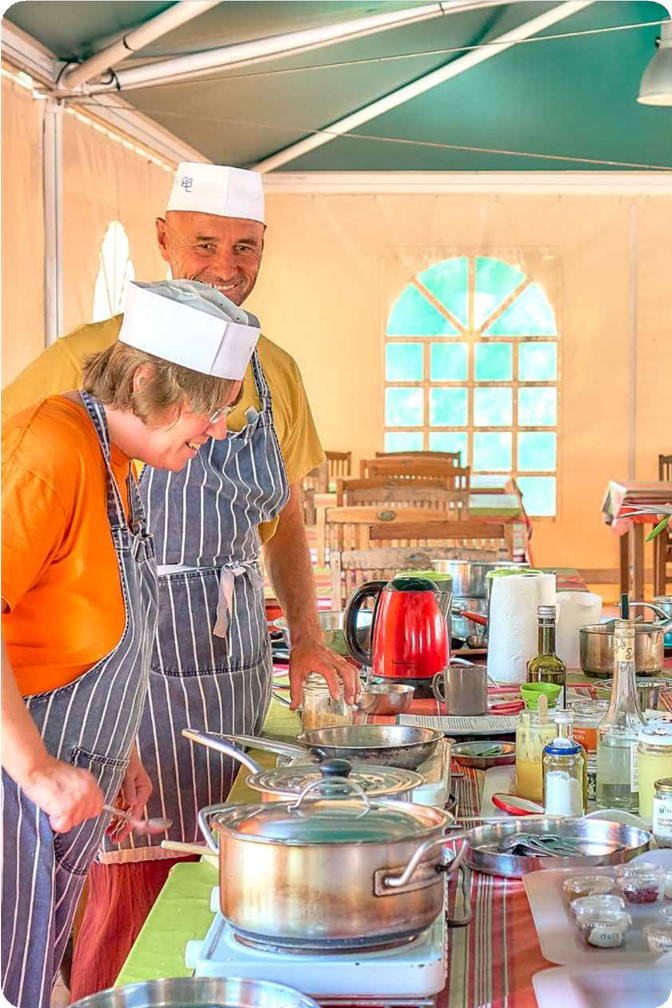 Fullness and Vegetarianism
Fullness and Vegetarianism
The reasons for a food transition, from the predominant diet in our Western societies to a different diet practiced for thousands of years by other human societies, often result from becoming conscious of the faults or the errors of the active system in place.
It is interesting to note that the word ‘conscious’ comes from the Latin root ‘cum’ which means ‘with’, and ‘scientia’ which is related to the Latin verb ‘scire’ which means ‘to know’.
To become conscious therefore means ‘to know with’ … that is to say ‘to bring to one’s mind’ that the me-subject is well- connected to the object or phenomenon
that I describe. So, this means that the me- subject has a power of action over what I observe and understand.
Becoming conscious, to succinctly summarise the action, consists of linking things, objects or events together and also, of using mental and intellectual activity. ‘Our brain’ is there to solve problems, to find solutions. It allows us to overcome difficulties in everyday life, whether it is on an individual or a collective scale.
These little philosophical paragraphs may seem far from our subject, Why become vegetarian?, but we will see that on the contrary, they enlighten the situation!
In reality, becoming conscious of things or situations is entirely an ecological attitude because ecology, in its most pragmatic definition, is the science that studies the links or relationships between one (or more) organism(s) living with its (their) environment (biotope).
And to take a step further in our reflection, we will emphasise that human ecology is the science that studies the links and relationships between human beings (societies and/or indivi- duals) and their surrounding environment.
It analyses the im- pacts caused by their activities that are put in place to satisfy their primary needs, or not. This makes human ecology a trans- versal discipline, treating many other disciplines.
Concerning the need to eat, if other sciences such as sociology teach us that human societies build their foundations around their eating habits, we can present the notion of ‘food system’, because it is from this system that we can analyse the stakes and the consequences of a diet mainly based on plant resources, as is vegetarianism.
The notion of ‘food system’ links together the different stages that bring us our diets, which are the production of food resources, their transformations, their distributions and finally their consumption.
These different levels of the system obviously have physiological, economical or ecological impacts on individuals, societies and the environment. These impacts will be different depending on the diet.
The interest in the analysis is obviously to find dietary models that have the most beneficial impacts possible for im- proving the health of the economy, the people and of nature.
Eating Habits or Diet
We need to know that in a system, we cannot touch or modify one level without affecting all the others, which also implies that nowadays our act of eating can have effects at thousands of kms away, from farm to plate. Few of us accord this the right amount of importance to our food choices.
Nowadays, numerous studies and analyses show the total impact of our diets based on a consumption ratio of 70-75% of foods of animal origin to 25-30% of foods of plant origin, and this with the perspective of feeding 9-10 billion human beings in the decades to come.
Meat production is a very costly industry, with many negative socio-economic and environmental impacts (destruction of agricultural models, over-exploitation
of soils, deforestation, depletion or exhaustion of aquifer or fishery resources, food pollution and contamination, climate change, etc., etc. …) the list is long and demoralising!
The question, Why become vegetarian? therefore takes on its full meaning in this analysis because reversing the dominant ratio of consumption of animal products to plant ones (75:25) in the population of ‘rich’ countries, is part of the solution to this problem.
This food transition really brings benefits to the environment even more if we eat local, organically farmed food, as well as bringing major socio-economic benefits. To add a little humour, if eating vegetarian food is good for the heart, it is also good for the pocket of individuals, and of communities!!!
(Watch on YouTube: “Comment nourrir l’avenir?” / “How to feed the future?” Only available in French)
To introduce this paragraph, I allowed myself to speak of the fullness of being vegetarian because finding a solution to an individual or collective problem brings fullness, serenity, and ‘peace of mind’. The alignment of our thoughts, our words and our actions in a coherent dynamic, leads to fulfil- ment by providing people with great psychological strength.
Currently (but also for a long time past), moral values, philosophical thinking or religious beliefs, and knowledge in the light of our science, and our individual and collective rise in awareness, all lead us to question the act of killing or exploiting animals to satisfy our food needs.
Here too, the process of becoming vegetarian finds a positive resonance with the problem and allows us to respect our sensitivities.
Many ideologies or movements develop around these topics, but I will not address them here. I would simply point out that human experience shows that our intellect or our consciousness are not always sufficient to lead us sustainably towards a food transition.
Trying, practicing, living vegetarianism and feeling its bene- fits in our body and in our mind, through an improvement of our physical as well as psychological health, are undoubtedly very important in the vegetarian approach, but one ingredient is lacking … and this ingredient is joy.
Joy and Vegetarianism
The notion of joy in any change of habit, whether it is food or something else, is essential. This is the true driving force of change.
For a new behaviour or attitude to be sustainable, it must bring us at least as much, if not more, joy than the previous behaviour did. Nevertheless, the notion of joy is complex, and … dynamic. It evolves and can educate itself, but it always requires an open mind, open ears and respect for oneself.
In the choice of vegetarian eating, the joy of well-prepared, tasty, refined, colourful, varied dishes is very important. The good news for non-vegetarians who are wondering about this diet and want to take the step, as well as for experienced vegetarians, is that a high-end gastronomy of vegetarian cuisine exists. The spices, textures, colours, the ingredients are countless and the creativity of each and every one can be fully put into action.
In addition, the joy of eating is inseparable from the joy of sharing, of taking communion together around a table. This aspect is important and not to be neglected in the choice of becoming vegetarian. This applies as much to someone em- barking on the adventure as to those accustomed to this diet.
Being able to share meals with family, friends, relatives and other people is part of this emotional balance, which is not, of course, strictly speaking simply linked to the vegetarian diet, but for someone who practices this diet, sharing must also be fully experienced.
The pleasures from making and eating tasty vegetarian dishes and of sharing them with others are all good emotional reasons that generate well-being of the mind, body, and on us. Regardless of whether we adopt and maintain this diet, it is much more important that we consider them.
Learning about vegetarian cuisine is easy these days. Books, blogs and workshops abound in all countries of the world and we can only be very grateful to those who share them. However, not citing anyreferences here leaves everyone the joy of making these discoveries for themselves.
Conclusion
Nowadays, opposite food transitions are evolving and are taking place before our very eyes.
“According to FAO (the Food and Agriculture Organization), world consumption of animal proteins is increasing (in a 2007 report, it is mentioned that it would have doubled in less than 50 years) and this in the ‘developing’ countries or developed countries like China.”
Although the vegetarian (or vegan) population continues to increase in rich countries, there is also a significant decrease in overall meat consumption.
Unfortunately, population and demographic growth distribution show that the current food dynamics still favour the over- consumption of animal proteins.
If, as we have seen briefly above, the negative consequences of these choices are multiple: climate change and the rising oceans have become major concerns for the world’s population.
Still, according to the FAO, “raising animals necessary for food is responsible for 15% of total greenhouse gas emissions, which is more than transport”. In 2019, the IPCC (the Inter- governmental Panel on Climate Change, a group of experts in the United Nations) indirectly suggested in its annual report, giving pride of place to plant proteins because, “the reduction in livestock production is to be considered as one of the best strategies for stopping global warming and de- forestation”. (YUKA, 2019)
If this news has opened many debates in our Western societies, as we have already said, becoming a vegetarian is not (and probably never will be) an ‘official’ suggestion coming from our institutions. it remains a rather personal challenge, not always easy to live with, and not always socially accepted. Achieving this either for emotional, moral or even health reasons is a very personal choice and hardly questionable.
In reality, the reasons that bring about and solidify this food transition, are a mixture of all those mentioned above. We cannot generalise or rationalise them with the aim of convincing people and this article does not set out to do so. In these changes, it is the very notions of mixture, balance and dynamic that intervene, that are the characteristics of a living process that is getting into action.
Nowadays, economic improvements for individuals, as well as populations, bring at least a basic freedom, to choose what we put on our plate. This choice is taken in the light of our reflections and our knowledge. So, we are free to make fair and durable, individual choices.
We often miss out on the fact that these individual choices quickly have a collective impact, as long as they are shared, multiplied and well-rooted in each and every one of us.
But for a vegetarian (as for any other cause), it is useless to try to impose our individual ideas, because as Gandhi said so well, “The example is not the best way to convince, it is… the only way”.
Jean James Garreau hold a PHD in biology and founded Sojami, a company specialising in lacto fermentation of soja milk.
He created a research platform in human ecology, the IRENIS association and co- directed the documentary ‘Comment Nourrir l’Avenir?’ Which can be seen on Youtube. Recently, he launched the project jedelesprit.com on how to nourish the spirit.

